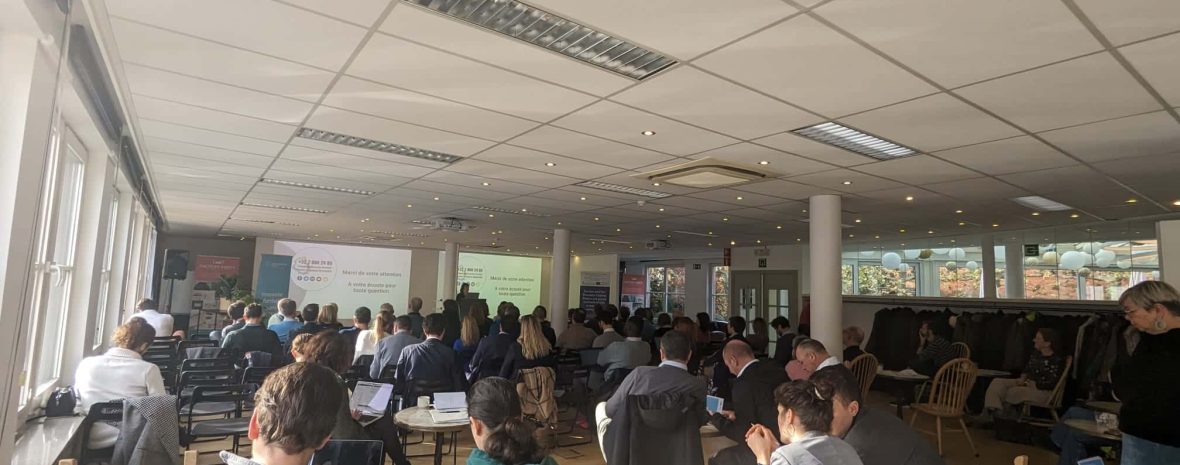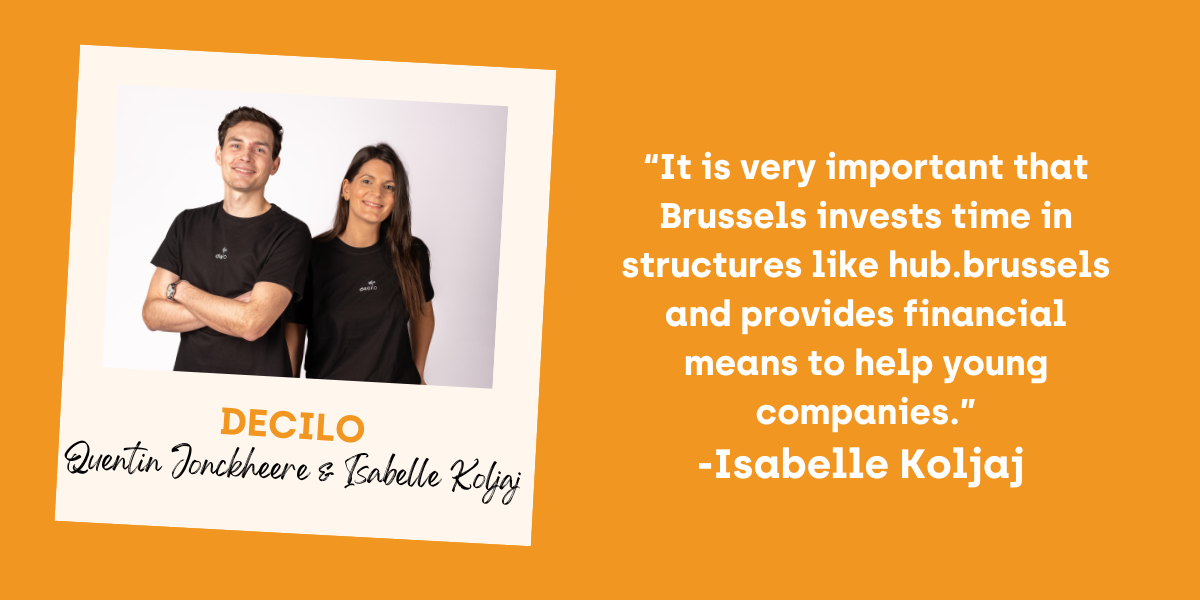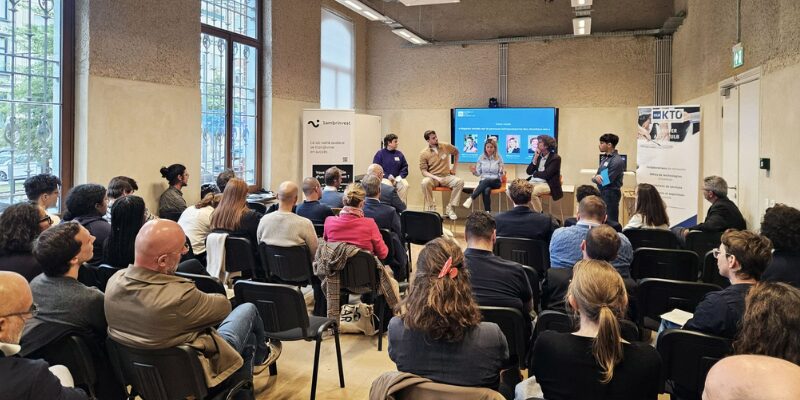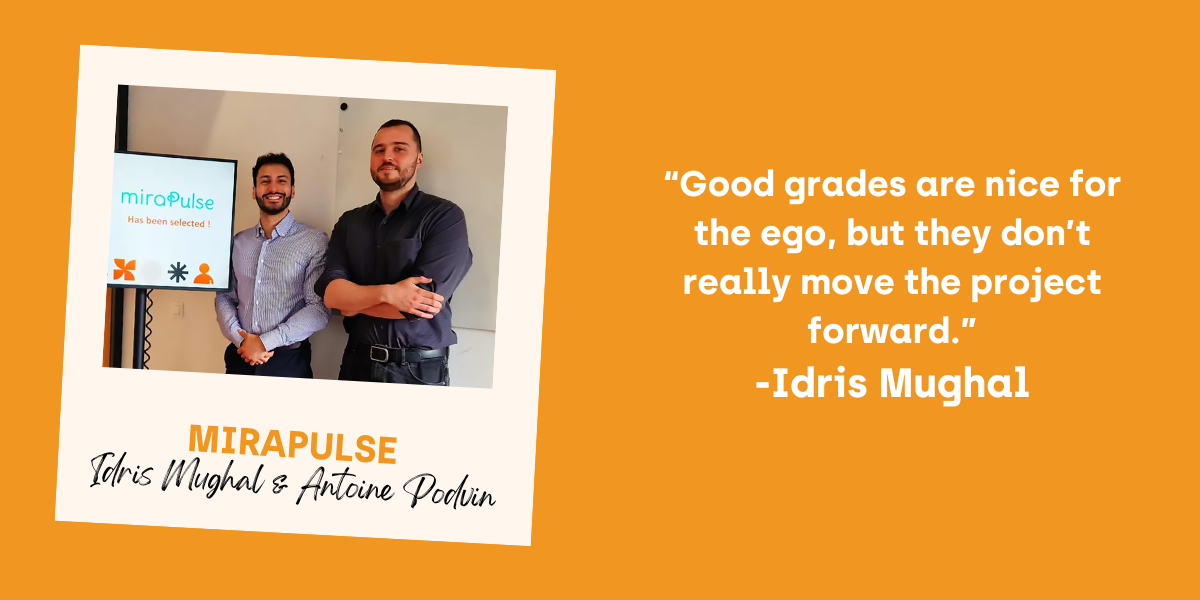Over the course of 2 days, lifetech.brussels brought together 150 participants to tackle the big topic of prevention in healthcare. In the rooms of Factory Forty, people discussed, shared and exchanged ideas.
📸Relive the event with pictures! 📸
What happened there?
The topic was clear: while prevention is a major theme in today’s society, how can we understand, prepare and shape the future of prevention? « I came from France for the subject of course, but also because here in Brussels it’s amazing how easy it is to talk to anyone. So I’m here to network, meet great people and see how things work here » said a person from Digital Medical Hub. « Me? I want to collect best practices », said another one.
Students, healthcare professionals, startups, researchers, representatives of healthcare services, associations, local authorities and even foreign speakers – a varied and comprehensive ecosystem was gathered around 3 axes: how can we offer prevention solutions tailored to the people who need them, and how can we raise awareness and get people involved in improving their health? How can collaboration between startups and hospitals be successful? How to test and validate prevention solutions? How to finance prevention?
« Working in the healthcare sector, I came here out of curiosity – perhaps I’ll come away with a few bright ideas, or simply learn about the current state of knowledge », said a hospital representative.
Before giving any answers, the organizers proposed a hackathon to its participants, facilitated by Hack Belgium Labs through the voice and enthusiasm of Leo Exter: « the success of a hackathon lies in the variety of people you bring together in teams, and in the pace you set – slow enough for minds to start thinking and developing ideas, fast enough to avoid going round in circles and people getting bored. This 3-challenge session is pretty intense and difficult, so we need to keep the energy and motivation up. »
3 challengers representing different types of organizations came up with a problem linked to health prevention they were facing, and 10 teams took up the challenge each time. Two hours to present the challenge and its central idea, understand it, form the team, sketch out ideas, produce a poster and present it to a jury made up of a business angel and board member, a member of lifetech.brussels team and each challenge holder.
At least 20 great ideas emerged from the brainstorming, of which three were selected by the jury to be pushed forward, developed, and hopefully become concrete options and deployed solutions. Each idea is, of course, roughly shaped here, and needs to be refined and confronted to become real, as it is the result of a brief brainstorming session.
Hackathon – 1st Challenge & Winning Solution
The first challenge, “Early indicators”, was taken up by Rik Vanhoof, Director of the Belgian Heart League. It can be summarized like this: “How can we collect data and early indicators on people’s state of health (in this case, cardiovascular health), so as to be able to refer them more quickly to a doctor if necessary? How can we effectively alert these patients, by integrating different types of information, data and technologies? »
The chosen solution, called “Shopping Cart Reward“, proposes to analyze people’s shopping habits and the contents of their shopping cart over a given period. People considered to be at risk, based on their purchases, would then receive a “treatment” in the form of a reward, a pleasant way of testing their health and, if necessary, referring them to a doctor.
More about Rik’s challenge and the winning solution
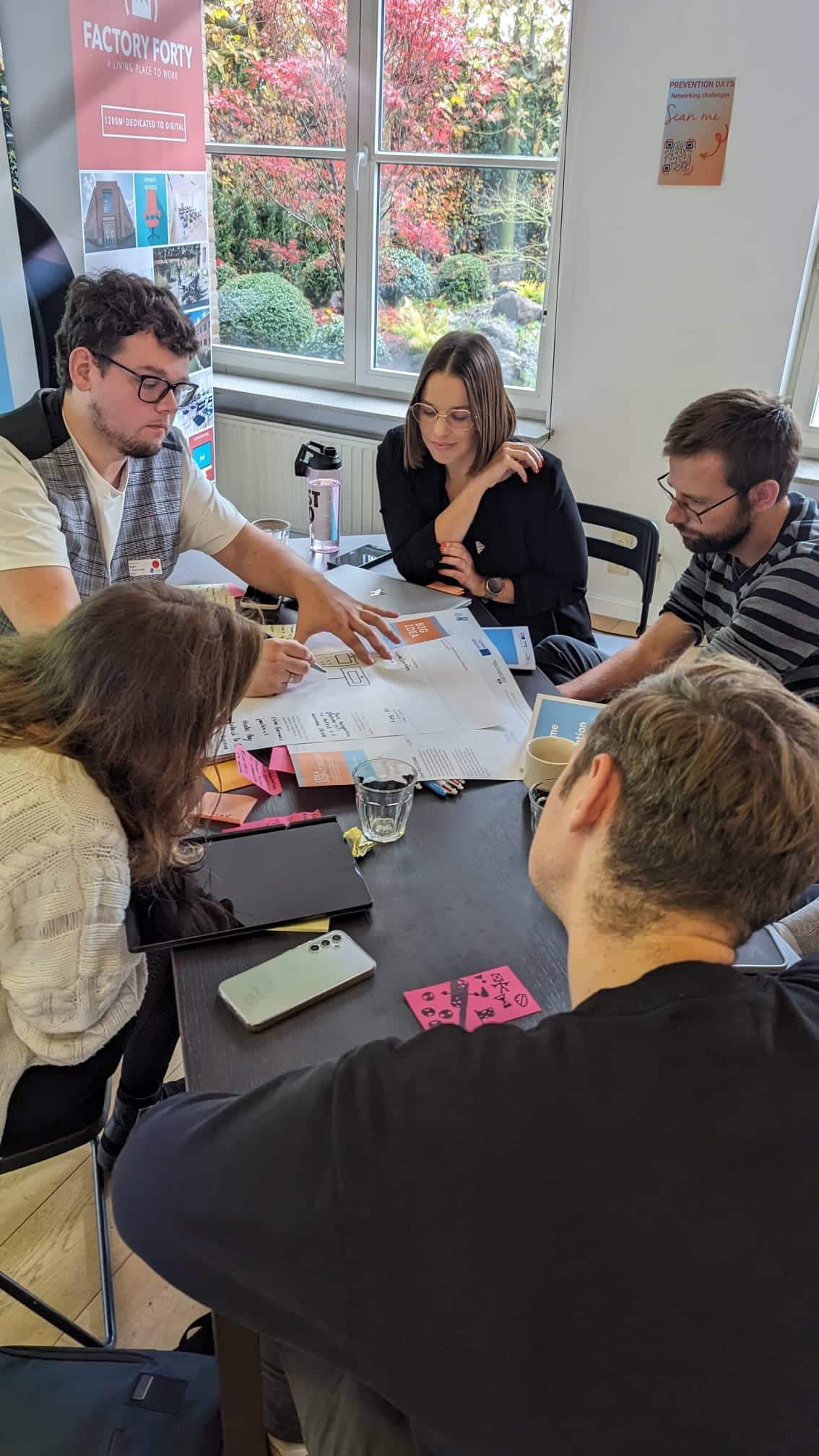
Hackathon – the 2nd Challenge…and its answer
Magali Graindorge, Head of Digital and Data Expertise from Mutualité Chrétienne(MC), then brought a second challenge: “Leveraging data for a healthier lifestyle”. The central question was how to use data collected at population level by the MC, combined with individual lifestyle data, to encourage MC members to adopt a healthier lifestyle – in a GDPR-compliant way. The proposed solution provides personalized data-driven recommendations to modify aspects such as physical activity or eating habits.
+ Among the many proposals, the one that was chosen was inspired by the Tamagotchi principle. “MC-Gotchi” envisages the creation of a virtual twin of the person in the existing Mutualité Chrétienne application, fed by the user’s personal data and habits, as well as MC data. Personalized challenges would be proposed to this avatar, with objectives adapted to its profile. The app would also encourage the creation of a community to motivate and compare progress, while providing information on health problems avoided and offering rewards for challenges met.
More about MC’s challenge and the winning solution
Hackathon – the 3rd tricky challenge…and a proposal!
To close the first day, Sonia Van Dooren, Innovation Manager at UZ Brussel, challenged the participants about « Gold standards for preventive care ». How can we establish reference standards for testing prevention-oriented products and services, measuring their quality, effectiveness and economic impact? How can we ensure that these innovative solutions can be reimbursed? Indeed, one of the issues with prevention is that it takes a very long time to demonstrate its effects on a population or an individual – and if we stay with this approach, we’ll never be able to get out of the current configuration – motivating investments or behaviors, without being able to prove the benefits.
The idea behind the winning project called “Bending the curve” is to change our point of view: based on the data we already have, historical data, and taking into account information from new preventive healthcare solutions, we could use machine learning to identify and define “reference standards” in order to make ideal predictions about the chances of success. This would enable us to track the performance of new services against expectations and gain early insight into whether or not they are effective.
More about the UZ Brussel’s challenge and the preferred solution
Finally, all the ideas that emerged during the day will not be lost, even if they are not selected as winners, as Sonia explains: « Of course! Some ideas may even help us in our ambition to influence policy-makers. They’re not things we can implement on our own, but they’re important, and I can say ‘Look! These are ideas that came out of a hackathon organized by lifetech ! »
📸Relive the event with pictures! 📸
A second day of inspiring talks
After getting people thinking, brainstorming and coming up with ideas, the event enabled participants to benefit from inspiring ideas, listen to success stories, learn from the experiences of other players. Many of the brilliant ideas that emerged on the first day had similar foundations or characteristics, and were moving in a common direction of transparency, exchange, transferable data, data analysis and communication. Philippe Michel of the Hospices Civils de Lyon summed it up very well: « we’re all moving in the same direction, and it’s great ». Indeed, it seems to be a consensus on the direction to take, wherever we come from France, the UK, Denmark. And these are “only” some of the countries that were represented during the event, and while everyone recognizes that there may be cultural and legal differences between countries and populations, even so, as Keith Grimes, puts it, « there’s a challenge in taking ideas from one place and trying to apply them in another », which means you’ll have to adapt your product and the way it’s presented to suit the market you’re targeting, it’s all about the solution and how to actually implement it, case by case. On a larger scale, health problems are similar in our Western countries. « Health needs are the same! » said Philippe Michel. Through the UK, Belgium or France, we could even say that diseases, health trends and problems are the same, cultures are similar, which leads to the idea that we can, we must, inspire ourselves from what’s happening beyond our borders. Something that Belgian companies and startups are already doing very well: « in France, our companies think mainly about the “French market”, which is actually large enough for most of them. They don’t think about exporting until later, sometimes too late. Here in Belgium, before they even get started, startups are already thinking about international and multicultural solutions. That’s an asset! » Said a Belgian entrepreneur.
Keith Grimes (Curistica), Laurent Hermoye (Imagilys), Erik Schokkaert (KU Leuven), Gaétane Thirion (BRUSANO), Philippe Michel (Hospices Civils de Lyon), Alexandre Vandermeersch (Evoluno), Sarah Scaillet (Federal Pension Service), Barbara Trachte (Brussels Secretary of State for Economic Transition and Scientific Research, Minister-President of CoCof), each with their own expertise, shared their vision of preventative care, approaching the subject from different angles: Brussels territorial approach (Gaétane Thirion), business financing (Imagilys), dissemination of best practices in clinical validation (Keith Grimes), collaborations with different types of players (Philippe Michel), examples of successful collaborations (Evoluno & the SFP), and impact on the overall organization of our healthcare system (Erik Schokkaert).
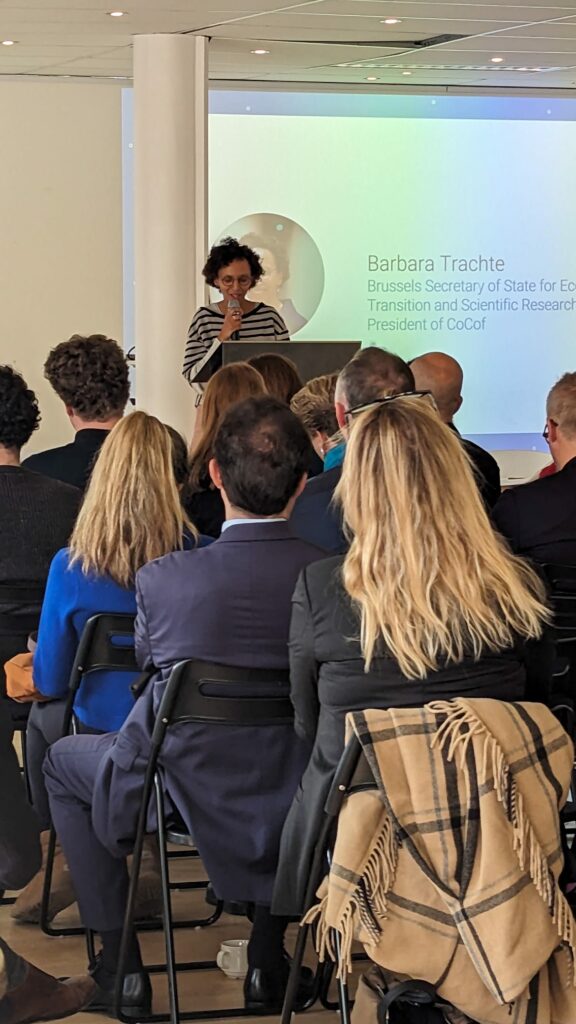
Deep dive into the 2nd day – Talks – best moments
Healthtech and innovation in health prevention to further shift the economy?
All the speakers at the event, wherever they came from, agreed on several points. Our environment, our consumption and our lifestyle have a major impact on our health (much more so than our genetics!). Prevention cannot be the task of a single player; it must involve all areas and all strata, so that responsibilities, information and successes can be shared. Whatever direction we take, we need more healthcare professionals, everywhere, to engage this new process in health policy. « What applies to medicine applies globally to the whole of society, and productivism, globally, is ultra-present. A system that remunerates doctors on a fee-for-service basis encourages them to perform acts and cure illnesses rather than prevent them. We can no longer afford to lose out to productivism, which is bad for the environment, bad for social conditions, bad for people and bad for health. It makes no sense, either personally or collectively » said Barbara Trachte, before concluding: « it’s time for all of us to open our eyes to the links between all these issues and accept that we need to change our economic system, our production, our relationship with the environment and our health. (…) Innovation is, of course, a wonderful and resourceful response to all this. » Collaboration is another, and the Prevention Days are a step in the right direction.
An event made possible by the financial support of FEDER.
